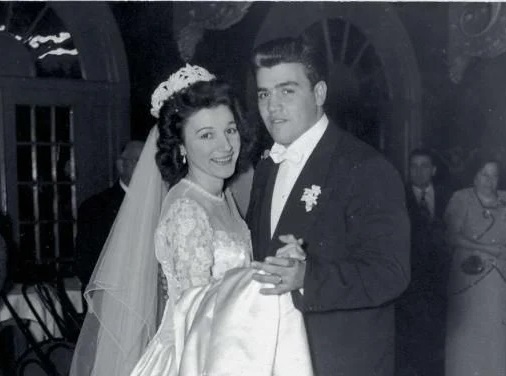| Real Name: | Olympia Grippa |
| Birthday: | N/A |
| Net Worth: | N/A |
| Height: | N/A |
| Occupation: | Wife of Vincent Gigante' |
Olympia Grippa may not be a household name, but her association with Vincent Gigante, also known as “The Chin,” makes her an intriguing figure. Her husband, a prominent mobster, led the Genovese crime family in New York City from 1981 until his death in 2005.
Despite the public’s fascination with her husband’s underworld dealings, details about Olympia’s own life and the legacy she has left behind remain largely behind the curtain.
While Vincent’s life was thoroughly documented and dramatized, Olympia’s story reflects the complexities faced by spouses of notorious figures. Her presence has been felt in various cultural representations, subtly shaping the narrative about mob families and the women within them.
Although she maintained a life away from the spotlight, her influence extends beyond her connection to her husband, casting a shadow on the fine line between fact and fiction in media portrayals.
Story Stages
Key Takeaways
- Olympia Grippa’s link to Vincent “The Chin” Gigante highlights her as a notable figure.
- Her personal legacy is intertwined with her husband’s infamous reputation.
- Media representations of Olympia contribute to the public’s understanding of mob family dynamics.
Life and Legacy of Olympia Grippa
Olympia Grippa’s life was inextricably linked with one of the most infamous crime syndicates, the Genovese crime family. As the wife of mobster Vincent Gigante, her experiences shed light on the complexities of being tied to organized crime in New York City.
Early Life and Family Connections
Olympia Grippa’s early life remains largely private, with few details available to the public.
The focus of her life’s narrative shifted significantly upon her marriage to Vincent Gigante in 1950.
Vincent, also known as Vincent “The Chin” Gigante, was deeply entrenched in the Genovese crime family, widely considered one of the most powerful entities in the New York City organized crime scene.
Olympia found herself enmeshed within this notorious crime family through marriage, sharing her life with Vincent, who sired their five children, including their oldest son, Andrew.
Involvement in Organized Crime
Olympia’s involvement with the Genovese crime family, albeit indirect, came through her marriage to Vincent, known for his stronghold over extortion rackets, conspiracy, and other mafia-associated activities.
Residing in Old Tappan, New Jersey, Olympia maintained a household while Vincent led the crime family’s operations from Greenwich Village and various parts of New York, orchestrating criminal endeavors such as racketeering and obstruction of justice.
Legal Battles and Public Perception
The legal skirmishes that Vincent Gigante faced invariably implicated Olympia, casting a shadow over her life with the specter of the legal system and its pursuit of organized crime.
Vincent’s numerous legal altercations included charges ranging from attempted murder to racketeering conspiracy.
These events orchestrated by federal prosecutors placed Olympia in the public eye, affecting her public perception.
Despite living with the reality of Vincent being in and out of federal prison, she navigated her life with resilience, guarding the privacy and unity of her family.
Cultural Impact and Representation
Exploring the cultural impact and representation of Olympia Grippa intertwines with the perceptions, narratives, and legacies that shape communities and the broader society. This journey spans from media portrayals to the ripple effects on society’s fabric.
Media Portrayals and Fictional Depictions
Olympia Grippa’s life story has been explored in various forms of media, casting a spotlight on how stories are shaped.
Forest Whitaker’s portrayal in Godfather of Harlem paints a vivid image of mafioso in popular culture.
Similarly, Vincent D’Onofrio depicted the life of a crime family leader in fiction, presenting these figures in a humanized, if sometimes glamorized light.
Personal Reflections and Legacy
The influence of such authority figures as John Gotti and Vincent “The Chin” Gigante extends into the personal sphere, with their actions and decisions echoing in their personal reflections and legacy.
Their lives left a lasting impact on family and loyalists, often remembered with a touch of nostalgia and reverence by those who saw in them a representation of power and defiance.
Impact on Communities and Society
Individuals like Vincent Gigante, while known for the crazy act designed to evade justice, have left indelible marks on the communities of Little Italy and Greenwich Village.
Their interactions with the local environment carved deep narratives into the cultural memory of neighborhoods and influenced the social dynamics within.
- Little Italy: A hub for Italian heritage, transformed by the presence of organized crime.
- Greenwich Village: A once-bohemian enclave, with echoes of its past in the shadows of mob history.
Continued Influence and Developments
The legacy of crime family leaders continues to affect modern society, with federal prosecutors and investigators still unraveling the impact of the Genovese crime family on the broader context of New York City.
Surveillance and police force techniques developed in response to these families are a testament to their persistent influence.
- Surveillance: Evolved as a tool to dismantle organized crime networks.
- Legal Developments: The justice system adapting to new forms of organized crime.
Conclusion
Following the decline of figures like Vincent Gigante, their stories continue to resonate, influencing culture and society.
The threads of their narratives will remain woven into the fabric of history, shaping perceptions and challenging future generations to reflect on the complexities of charisma, power, and morality in the context of community representation.
